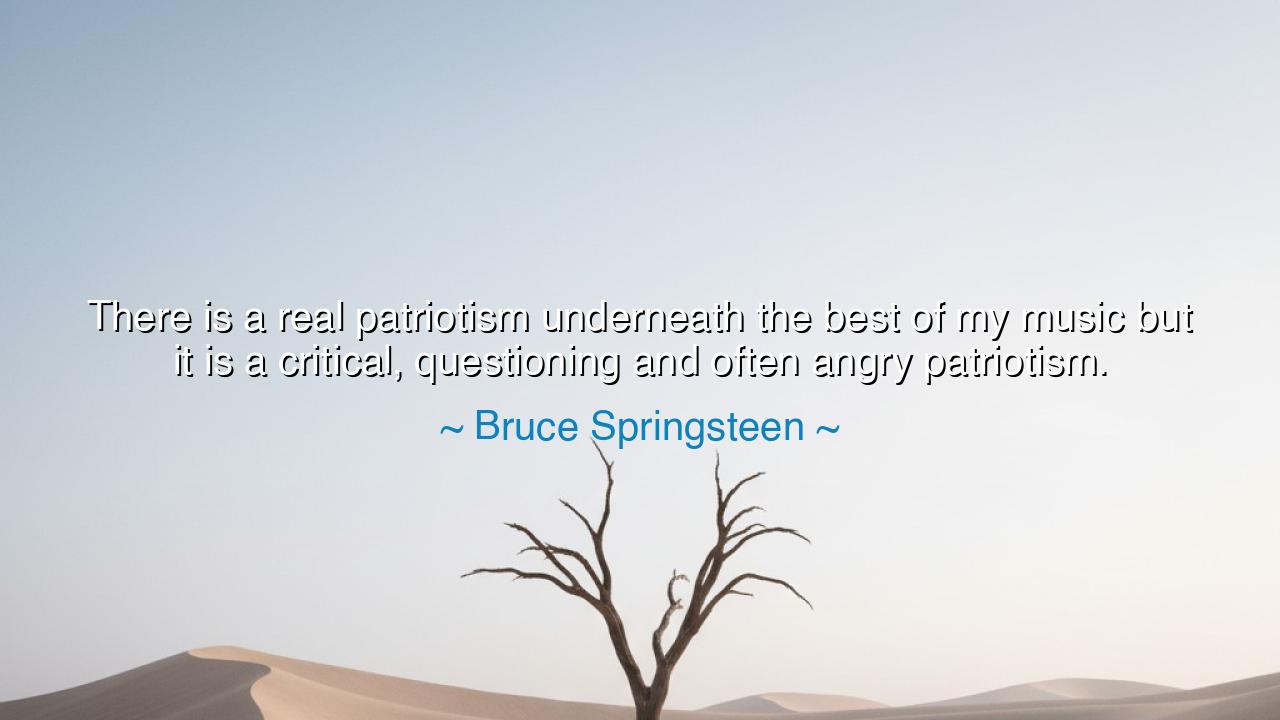
There is a real patriotism underneath the best of my music but
There is a real patriotism underneath the best of my music but it is a critical, questioning and often angry patriotism.






The words of Bruce Springsteen—“There is a real patriotism underneath the best of my music but it is a critical, questioning and often angry patriotism.”—carry the weight of a troubadour who has sung not merely to entertain, but to awaken. His music, forged in the struggles of working men and women, was not draped in blind pride or shallow sentiment. Instead, he gave voice to the kind of patriotism that dares to question, to criticize, and even to rage against injustice—yet remains rooted in love for the land and its people. His patriotism was not silence, but song; not submission, but truth.
At the heart of Springsteen’s declaration lies a paradox: that anger itself can be a form of love. Just as a parent’s rebuke is proof of care, so too the artist’s cry of discontent is proof of devotion. When he sang of the broken promises of the American dream, of factories shut down and veterans abandoned, he was not rejecting his country—he was calling it back to its truest self. His patriotism was not flattery, but fidelity to the ideals of justice, dignity, and hope. He sang in order that the people might not forget who they were meant to be.
This truth has been echoed by prophets and patriots throughout history. Consider Frederick Douglass, who in 1852 delivered his scorching speech, “What to the Slave is the Fourth of July?” His words were filled with fury at a nation that celebrated liberty while millions remained in chains. Yet beneath the anger was a deep, abiding patriotism, for Douglass believed that America could and must rise to its founding principles. Like Springsteen, he practiced a critical, questioning patriotism—one that demanded honesty, not hypocrisy.
We see the same in the voices of the civil rights movement. Martin Luther King Jr., in his letter from a Birmingham jail, spoke not as an enemy of America, but as one who loved it enough to call it to repentance. His rebuke was sharp, his patience worn thin, yet it was born of loyalty to the higher dream of equality. His patriotism was not the waving of the flag at parades, but the marching of weary feet toward justice. In this spirit, Springsteen stands as heir to the same tradition: a voice of music joining the chorus of conscience.
The ancients too would recognize this kind of loyalty. For they taught that the truest friend of the city is not the one who flatters its rulers, but the one who speaks hard truths for its preservation. Socrates, condemned for questioning Athens, insisted that his rebukes were proof of his devotion to the polis. Likewise, Springsteen’s angry patriotism is not betrayal, but the higher form of love that refuses to let a nation wither in its own delusion.
The lesson for us is powerful: true patriotism is not silence in the face of wrongs, nor is it blind acceptance of every policy or leader. It is the courage to hold one’s nation accountable to its ideals, even when that accountability burns with anger. It is to love one’s homeland enough to demand that it be better. A people who refuse to criticize cannot grow; a nation that silences its artists and prophets cannot endure.
In daily life, this means practicing a patriotism that questions without ceasing. It means listening to the grievances of the poor, standing with those abandoned, and raising your voice against injustice in your community and your nation. It means singing, speaking, or working with all your strength so that the country you love may also be the country it ought to be. This is not easy, for it requires both courage and compassion—but it is the only patriotism worthy of the name.
Thus let Springsteen’s words echo: patriotism can be critical, questioning, even angry. For the anger of the righteous is the fire that refines, and the questioning of the loyal is the compass that guides. Let us then be patriots in the truest sense—not by hiding the wounds of our nation, but by tending to them, so that the flag may stand not only for strength, but for justice fulfilled.






AAdministratorAdministrator
Welcome, honored guests. Please leave a comment, we will respond soon